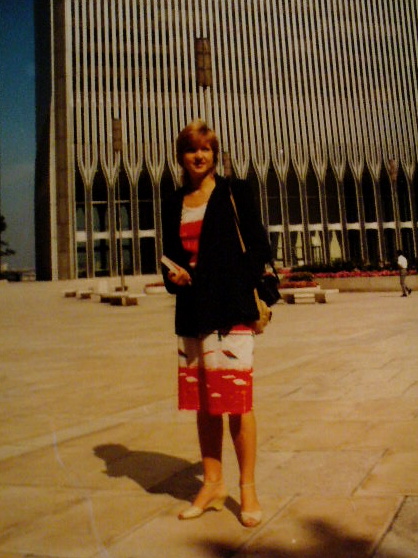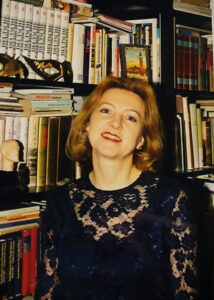Daniela Uhrová
“Kde domov můj, kde domov můj?” (“Where is my home, where is my home?”) This is the chorus of the Czech national anthem. I wasn’t thinking of home when I read those few lines in the daily Lidová demokracie (People’s Democracy) that August morning in 1979. I have nothing to lose anymore, I thought and began to wonder how to organize everything. The newspaper said that Ceaușescu, the then Romanian president, closed the borders with Hungary because of the oil crisis. So all the tourists from the eastern states who wanted to or already were on their way to Bulgaria by car could not travel through Romania. It was quickly decided that for about two weeks, all those who had already arranged for a holiday in Bulgaria could go through Yugoslavia without an exit visa. That was my opportunity.
Ten years after the failure of the Prague Spring and the onset of “normalization”, after ten years of control, spying, bullying, persecution, interrogation, ban on studying, ban on travelling, with no passport, I decided to leave my homeland, my home. I managed to get to Belgrade after two days, hiding in a truck. Fifty Deutschmarks was enough for two nights in a pension. Now what?
Inevitably, I had to ask my mother for help. She had been living with my younger brother in Germany for ten years. Neither the Austrian nor the German consulates in Belgrade would let me in. Even back then, a sentry box with a security guard stood before the entrance. It was there to check if a person had all the necessary documents for entry. I did not. How could I? I was without a passport, without a permit. “It is not in the interest of the Czechoslovak Socialist Republic” for me to travel to Yugoslavia or anywhere else. This verdict – one of too many to count – was delivered to me in Germany after several months.
Yes, I finally did get to Germany

Yes, I finally did get to Germany, but I was not very welcome. My mother had to sign a statement that vouched I would not ask for financial assistance from the Federal Republic of Germany, and that I would be taken care of, either by her or by myself. It wasn’t that easy, because her new husband didn’t want her to help me by any means. And my relationship with my mother was already complicated. Despite all this, she helped me get from Yugoslavia and eventually also helped me in Germany.
I arrived in Erlangen in Bavaria, my new home, a week after leaving my native Prague. At the police station, they photographed me as if I were a criminal: from the right, from the left, and face forward. They took my fingerprints and wrote up a report. The next day I was supposed to report in Zirndorf, to a large American-run refugee camp. The Americans were making decisions about political asylum together with the Germans back then. The questioning was not lengthy, but among other things, I had to answer certain questions that strongly reminded me of those from the Communists. Another absurdity! Nevertheless, I received my papers stating that I was an asylum-seeker quite quickly. However, I had to establish permanent residence in Erlangen, and I wasn’t allowed to leave it without permission.
I got a work permit very quickly despite the fact I could barely speak German. So the possibilities of work were initially pretty limited. I still had the desire to study in my head, even though I was almost thirty. About a month later, I started working for a well-known American fast-food chain – at just over 4 DM (Deutschmarks) an hour. My basic knowledge of German was enough for that.
I was looking for language courses, and finally, I found an opportunity to learn German for foreign students at the university. But it turned out that my high-school diploma was not recognized in Germany and they wouldn’t allow me to study. It was a shock. Even in the Czech Republic, it took me a lot of effort to get my diploma because I was deemed “politically unreliable”. So this was supposed to be the end of my dream of studying? Other school reports and apprenticeship certificates were also not recognized in Germany.
At that time, my mother worked at an eye clinic as a nurse. That fall, they began looking for assistants for night shift nurses, so I started working in the hospital several nights a month as a “girl for everything – an assistant nurse”. I enjoyed it more than fast-food work, and it was much better paid at 10 DM (Deutschmarks) per hour. Over a hundred marks a night, incredible! And then luck struck again when I came across a foundation that supported foreign students and migrants who wanted to study in Germany.
After six months, I was recognized as a political refugee, and I was given an appropriate passport with which I could move freely around Germany. To other countries, including Austria and Italy, I had to apply for a visa. But I could travel! And other possibilities opened as well; I received a one-year scholarship at the “Studienkolleg” in Munich. After two semesters and passing the final exam – “Feststellungsprüfung” – I was authorized to study at any German university. I was admitted to the University of Erlangen. I began studying there in 1982, three years after coming to Germany, history of art, library science and Slavonic studies.
We began to suspect they would close the IGW
In the summer of 1988, I finished my studies, which I financed entirely by night shifts at the clinic, with a Master’s Degree exam. That same year I also received German citizenship. In January 1989, I started working at the Institute for Society and Science (IGW) at the University of Erlangen. It was actually an institute for the analysis and scientific evaluation of certain Eastern bloc institutions. And just that year, political events in these countries gained momentum. The Eastern Bloc and the Soviet Union collapsed.
I assessed these events positively and rejoiced at the “Velvet Revolution”, the “clinking of the keys” and then when Václav Havel became president. After all, I used to go to the same pub with my group of friends as he did for many years. I had no idea that this development would cause me to lose my job. At first, it seemed that politics would need us. I started to travel to – what was still – Czechoslovakia, both for business and private matters. After a year, however, they told us that the institute where I worked would be evaluated and we began to suspect they would close the IGW. Soon after, I started teaching Czech at the university and passed a state exam in translation in Munich. So I got by for two years freelancing before I found a new job at the Germanisches Nationalmuseum in Nuremberg, where I worked until my retirement.
In 2019, after 40 years, I returned to Prague, where I still live today.





Tobias Springer
Liebe Daniela,
aus den Augen, aus dem Sinn? Sicherlich nicht (:-) . Jetzt hab ich Dich mal gegoogelt. Ich bin sehr gespannt, ob Du das lesen wirst. Ich hoffe sehr, dass es Dir in Prag so gut geht, so wie Du es Dir erhofft hast. Corona macht Nürnberg noch etwas langweiliger als es sonst schon manchmal war. Prag soll zu Zeit auch noch recht ruhig sein. Schön ist es aber immer. Bis jetzt haben wir es leider noch nicht geschafft, aber was nicht ist, kann ja noch werden.
Vielleicht meldest Du Dich mal.
Liebe Grüße
Tobias
valentin perko
It is very toucy autobiography.
Tine Perko
dr.daniela uhrova
Ahoj Tino, jsi to ty z Ljublany? Kako si? Imaš mailadresu? Ozvi se.
Zdravo Daniela
Maria-Anna
Liebe Daniela, das Sommerwochenende mit dir in Prag 2018 – einfach unvergesslich! Der c-Hype in der Welt 2020 auch in Tschechien und Deutschland einfach irre – wir werde uns Wiedersehen! Es gibt immer Menschen, die an uns glauben.
Herzensgründe, Maria-Anna im Wald
Susanna Brogi
Liebe Daniela,
wie schön, Dich hier wiederzusehen! Du erwähnst, dass Du (nach anderen beruflichen Stationen) schließlich in Nürnberg im Germanischen Nationalmuseum (GNM) gearbeitet hast. Wir, Deine ehemaligen Kolleginnen aus dem Deutschen Kunstarchiv im GNM, erlauben uns ein Postscriptum in eigener Sache: Du hast hier viele wunderbare Fährten gelegt, was uns anhaltend dankbar macht und somit gedanklich immer wieder zu Dir nach Prag führt.
Leider muss ich Deine wunderbare Dissertation “Das Tagebuch 1968. Jiří Kolář und der Prager Frühling” regelmäßig suchen, weil sie vom Archiv nach Hause und von zu Hause zurück ins Archiv wandert und meist ist sie im Archiv, wenn sie zu Hause benötigt und zu Hause, wenn sie im Archiv dringend gebraucht wird. Man könnte sich ein zweites Exemplar zulegen: Dich dagegen gibt es nur einmal.
Von Herzen weiterhin alles Gute
Deine Susanna